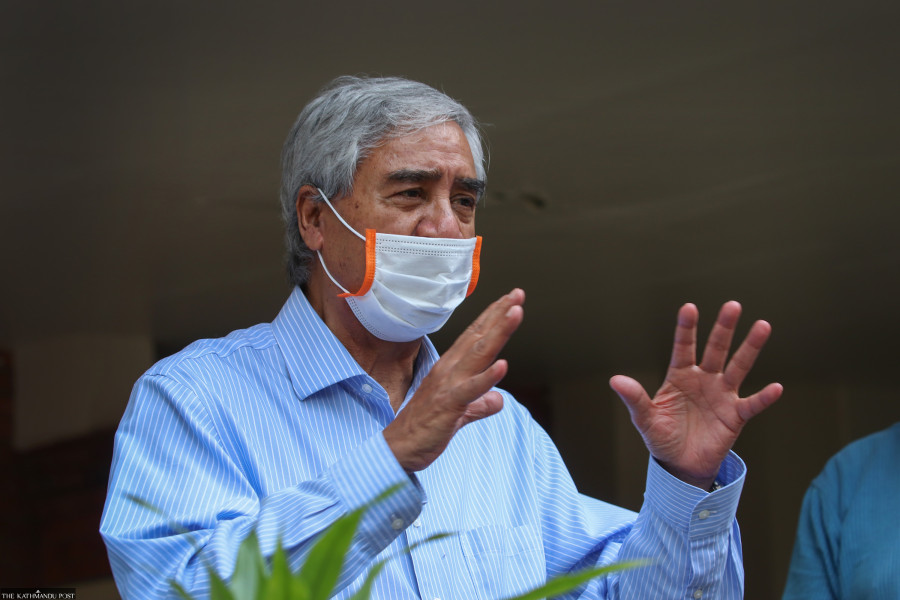Politics
Congress President Deuba set to return to power, for fifth time
The Congress leader needs to be appointed prime minister by 5pm today as per court order. UML’s Nepal faction, however, has severed ties with the opposition alliance.
Anil Giri
Hours after the Supreme Court overturned Prime Minister KP Oli’s decision to dissolve the House of Representatives and issued an order to the Office of the President to appoint Nepali Congress President Sher Bahadur Deuba as the next prime minister, the opposition alliance launched talks for government formation.
Stating that Oli’s claim for the post of prime minister even after losing a vote of confidence was illegitimate, the Constitutional Bench on Monday ordered to appoint Deuba as prime minister by 5pm Tuesday.
The Office of the President has already extended an invitation to Deuba to take the oath of office on Tuesday evening.
At least two senior Nepali Congress leaders told the Post that a small Cabinet, with around seven members, is likely when Deuba takes the oath of office on Tuesday.
“We have decided to form a small Cabinet initially,” Bal Krishna Khand, chief whip of the Nepali Congress said. “We want to form a coalition government and have asked other partners of the alliance to join the government led by Deuba.”
According to Nepali Congress leader, who did not want to be named, two from the Congress and as many, or even just one, from the Communist Party of Nepal (Maoist Centre) are likely to be appointed ministers.
With the Madhav Kumar Nepal faction of the CPN-UML, which had backed Deuba as prime minister and even provided signatures to his petition against House dissolution, deciding to sever ties with the opposition alliance, Deuba may face a tough time winning the vote of confidence.
Though the Upendra Yadav-led faction of the Janata Samajbadi Party and Rastriya Janamorcha have so far stood by Deuba, it was not immediately clear if they will join the government on Tuesday itself.
“Our case against the rival Mahantha Thakur faction is pending at the Election Commission,” a senior Janata Samajbadi Party leader from the Yadav faction told the Post on condition of anonymity. “Until our case is settled, we won’t join the Deuba government.”
The Election Commission is set to announce a decision on the Janata Samajbadi Party dispute on July 22. Both Yadav and Thakur factions have claimed that the party belongs to them.
The Thakur faction had supported Oli after he was reappointed prime minister on May 13. Last month, some members of the Thakur faction had joined the Oli government, but the Supreme Court disqualified their appointments as ministers.
Deuba has called a meeting with other alliance members on Tuesday morning and a meeting of the party’s office-bearers on Tuesday afternoon at his residence.
A senior Nepali Congress leader told the Post that members of the opposition alliance–Nepali Congress, Maoist Centre, Upendra Yadav-led Janata Samajbadi Party and Rastriya Janamorcha–will participate in the meeting to discuss the Cabinet formation on Tuesday morning.
On Monday evening, hours after the court verdict, a meeting of the opposition alliance was held at Madhav Nepal’s residence in Koteshwor.
According to leaders familiar with the meeting, Nepal communicated to Deuba that he would not remain with the opposition alliance and that he would rather continue his struggle within his party, the CPN-UML, where party chair Oli has alienated him.
As many as 23 lawmakers from the Nepal faction had supported the oppositional alliance’s petition in the Supreme Court demanding that the court restore the House and appoint Deuba as prime minister.
“We stood for democracy, the constitution and the system, so one cycle has been completed after the verdict,” Raghuji Pant, a UML leader quoted Nepal as saying during the meeting. “The verdict is the defeat of the Oli tendency.”
With the Nepal faction’s decision not to remain with the opposition alliance, two possible scenarios have emerged.
If the entire Janata Samajbadi Party, which has 32 lawmakers, supports Deuba during his vote of confidence, which he must seek by August 12, he will remain prime minister for about a year and a half, until periodic elections are held.
If Deuba fails the vote of confidence, the House would be dissolved, this time constitutionally, as per Article 76 (7). In that case, Deuba will lead a government that will oversee elections that must be held within six months from the date of House dissolution.
Despite the court order to appoint Deuba as prime minister, Oli had not stepped down until Monday night.
Oli, however, met with President Bidya Devi Bhandari on Monday evening.
According to sources, Oli communicated to the President that he would pave the way for the new government formation under Deuba.
But he is not going to resign, one of Oli’s aides told the Post.
“Is it necessary for him to resign?” asked Subas Nemang, a senior UML leader and Oli’s close confidante.




 9.51°C Kathmandu
9.51°C Kathmandu














